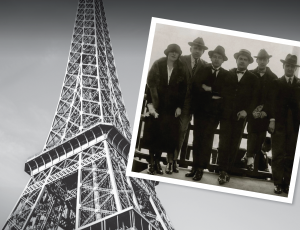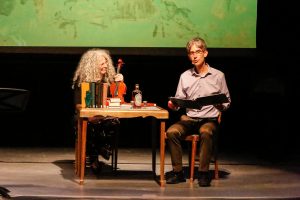Music theory at CU reaches across boundaries in multiple ways. Here are five:
JAZZ, DADA, AND THE MUSIC OF PARIS AFTER WORLD WAR I
CU on the Weekend
Keith Waters
Saturday, 28 September 2019 • 1–3 p.m.
Music Theater, Imig Music Building
(free entry with ticket to first 200 people; for more information see link above)
In the latest installment of Musical Conversations (a collaboration between CU Music Theory and CU on the Weekend), Keith Waters explores Parisian music after World War I. The music combined a wildly diverse range of artistic influences, including futurism, Dadaism and jazz, as well as popular music from the fairgrounds, circus and music hall. Musical collaborations with artists Pablo Picasso and Raoul Dufy, and poets Guillaume Apollinaire and Jean Cocteau all helped shape a musical aesthetic that fluctuated, in the words of one journalist, “between cubism and vaudeville.”
At the forefront was a group of six composers, Les Six, whose works used these popular music influences but ingeniously transformed them. The presentation will focus on the music of this group, and will include live performances of songs by Francis Poulenc, Louis Durey, and Arthur Honegger, as well as Darius Milhaud’s 1923 chamber work, La Création du Monde, one of the first concert works with distinct jazz influences.
 RHYTHM IN MUSIC SINCE 1900
RHYTHM IN MUSIC SINCE 1900
17–18 November 2019
University of Colorado Boulder
Rhythm in music since 1900 remains a rich and fascinating field of inquiry. This conference brings multiple perspectives to bear on this field. It addresses repertoires ranging from jazz and popular music to world music and art musics, and topics from performance and pedagogy to cognition and theory. The keynote features renowned pianist Pierre-Laurent Aimard, acclaimed particularly for his interpretations of music of our time. In addition to his keynote lecture-recital, Aimard will also play a full recital on 19 November.
You are invited to join us for Aimard’s lecture-recital (free and open to the public; no registration needed) as well as for other presentations (register here). View the conference schedule here.
THEORY TIDBITS

We are pleased to announce two new ventures of CU Music Theory. Look for Theory Tidbits, short blurbs presenting intriguing insights into the evening’s concert, in select Faculty Tuesday concert programs and in our new Facebook group (see below). Following the concert, audience members (including livestream viewers) are invited to post their thoughts and questions in the Facebook group and to connect via e-mail with the theory faculty author of the Tidbit.
This fall, tidbits will be found in these Faculty Tuesday concerts:
8 October: Schubert Die schöne Müllerin
29 October: Brahms G minor Piano Quartet
Our new Facebook group “CU Music Theory” will feature more tidbits, interviews, and opportunities to engage. Join at https://www.facebook.com/groups/ColoradoMusicTheory/ and be on the lookout for Theory Thursday posts by intrepid students Max Wolpert (DMA composition) and Rebecca Hamel (MM theory).

LINKING MUSIC THEORY AND PRACTICE
Guided by performance and theory professors, the five undergraduate students participating in the Linking Music Theory and Practice project delivered their original research in April. The audience heard a truly eclectic range of topics and compositions, from the interplay of convention and expectation in Carl Maria von Weber’s Clarinet Concerto, Op. 73 to realizing aleatory passages in Barney Childs’s Sonata for Solo Trombone. One project resulted in a newly-composed jazz piece! We’ll bring you these exciting projects in multimedia form in our next issue.
FACULTY ACCOMPLISHMENTS

Yonatan Malin wrote, produced, and performed in “The Beregovski Archives: Klezmer Stories from Soviet Ukraine to Boulder”—a blended concert, lecture, and theater piece with renowned klezmer fiddler Alicia Svigals (violin) and jazz pianist Uli Geissendoerfer (piano). Malin, Svigals, and Geissendoerfer brought archival material to life with stories, historic images and recordings, analysis, composition, improvisation, and audience participation. The performance also featured string players from Boulder Suzuki Strings, the Greater Boulder Youth Orchestras (GBYO), and the Boulder community. This was the opening event for the 2019 Archive Transformed residency, bringing an international group of scholars and artists together for collaboration, study, and creative work.
Steven Bruns concluded thirteen years of service as Associate Dean for Graduate Studies on June 30, 2019. In May, he participated in a panel at the JCC Mizel Arts & Culture Center in Denver and the Boulder Public Library on “Ethics, Morality and Social Justice” in connection with Central City Opera’s production of Britten’s Billy Budd. In July, he gave the pre-concert talk for the Takács Quartet’s performance at the Bravo! Vail Music Festival.
Daphne Leong’s book Performing Knowledge: Twentieth-Century Music in Analysis and Performance, each chapter co-authored with a performer (including many CU colleagues), is forthcoming from Oxford University Press this fall.
Karin Buer recently performed a program of Brahms and Beethoven on the Harmony in the Round recital series in Fort Collins and on the Longmont Museum’s concert series. This fall, she will present some of her dissertation research on the piano variations of Robert Schumann, Clara Schumann, and Johannes Brahms at CU Boulder and at the University of Northern Colorado. She has recently been appointed Outreach Coordinator for CU Music Theory.
Mark Arnett is currently working on a collection of choral settings of poems by W.B. Yeats and a collection of piano works for a 2020 release.
In August, Philip Chang delivered a presentation titled “The Farnese Settings of ‘Mirage’ and ‘The Elder Pharos’” at the Armitage Symposium, part of NecronomiCon Providence, a biannual international conference and festival of weird fiction, art, and academia.
Keith Waters’s new book, Postbop Jazz in the 1960s: The Compositions of Wayne Shorter, Herbie Hancock, and Chick Corea, was just published by Oxford University Press in July.
Header image by Amber Lamoreaux
Images for Rhythm in Music since 1900, Theory Tidbits, and Linking Music Theory and Practice by Tirachard Kumtanom, Badulescu Badulescu, and Pixabay.com respectively.
